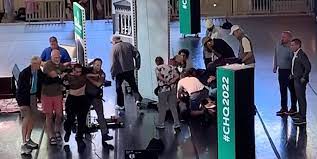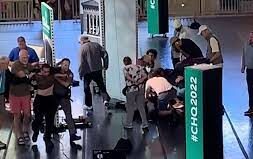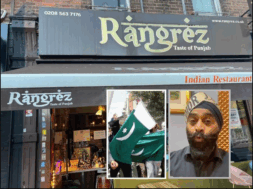
Rushdie’s Conditions Improve, Taken off the Ventilator, Talking
Manas Dasgupta
NEW DELHI, Aug 14: The Indian origin author Salman Rushdie, who sustained serious stab injuries at a literary event in New York, has been taken off the ventilator and “is talking” as his condition considerably improved on Sunday.
The president of Chautauqua Institution, where the author of the controversial book “The Satanic Verses” was stabbed, said in a tweet that Salman Rushdie has been taken off the ventilator and was talking. Rushdie’s agent, Andrew Wylie, also confirmed the development.
Witnesses said Rushdie was about to speak at the event when the suspect rushed onstage and stabbed him before being wrestled to the ground by staff and other people in the audience. The interviewer, Ralph Henry Reese, also suffered a facial injury in the attack but has been released from the hospital, police said.
Salman Rushdie had to be airlifted to the hospital where he underwent emergency surgery. He may lose an eye and the nerves in one of his arms were severed and his liver was damaged, according to his agent.
The author was stabbed in the neck and abdomen approximately 10 times, prosecutors said during the arraignment of Hadi Matar, the 24-year-old man accused of stabbing Salman Rushdie, in a New York court. A preliminary review of Matar’s social media showed him to be sympathetic to “Shia extremism” and the causes of Iran’s Islamic Revolutionary Guard (IRGC). Hadi Matar pleaded not guilty to attempted murder and assault charges in what a prosecutor called a “pre-planned” crime.
An attorney for Hadi Matar entered the plea on his behalf during an arraignment in western New York. The suspect appeared in court wearing a black and white jumpsuit and a white face mask, with his hands cuffed in front of him.
A judge ordered him held without bail after District Attorney Jason Schmidt told the court that Matar took steps to purposely put himself in position to harm Rushdie, getting an advance pass to the event where the author was speaking and arriving a day early bearing a fake ID. “This was a targeted, unprovoked, pre-planned attack on Rushdie,” Schmidt said.
Public defender Nathaniel Barone complained that authorities had taken too long to get Matar in front of a judge while leaving him “hooked up to a bench at the state police barracks.” “He has that constitutional right of presumed innocence,” Barone added.
The attack on Salman Rushdie was met with shock and outrage from much of the world. US President Joe Biden condemned the “vicious attack” and said the writer stands for essential and universal ideals — truth, courage and resilience. “I am grateful to the first responders and the brave individuals who jumped into action to render aid to Rushdie and subdue the attacker,” President Biden said. “Salman Rushdie — with his insight into humanity, with his unmatched sense for story, with his refusal to be intimidated or silenced — stands for essential, universal ideals,” the statement read. “Truth. Courage. Resilience. The ability to share ideas without fear. These are the building blocks of any free and open society,” Biden said.
British leader Boris Johnson said he was “appalled,” while Canadian Prime Minister Justin Trudeau called the attack “reprehensible” and “cowardly.” Authors, activists and government officials cited Rushdie’s courage and longtime advocacy of free speech despite the risks to his own safety. Writer and longtime friend Ian McEwan called Rushdie “an inspirational defender of persecuted writers and journalists across the world,” and actor-author Kal Penn cited him as a role model “for an entire generation of artists, especially many of us in the South Asian diaspora toward whom he’s shown incredible warmth.”
Rushdie, 75, was propelled into the spotlight with his second novel “Midnight’s Children” in 1981, which won international praise and Britain’s prestigious Booker Prize. His 1988 book “The Satanic Verses” was considered by some Muslims as disrespectful of Islam and the Prophet Mohammad. The novel led to a fatwa, a religious decree, by Iran’s first supreme leader Ayatollah Ruhollah Khomeini. The threat forced him into hiding for several years.
Hadi Matar is from Fairview, New Jersey. Rosaria Calabrese, manager of the State of Fitness Boxing Club, a small, tightly knit gym in nearby North Bergen, said Matar joined April 11 and participated in about 27 group sessions for beginners looking to improve their fitness before emailing her several days ago to say he wanted to cancel his membership because “he wouldn’t be coming back for a while.”
Gym owner Desmond Boyle said he saw “nothing violent” about Matar, describing him as polite and quiet, yet someone who always looked “tremendously sad.” He said Matar resisted attempts by him and others to welcome and engage him. “He had this look every time he came in. It looked like it was the worst day of his life,” Boyle said.
Matar was born in the United States to parents who emigrated from Yaroun in southern Lebanon, the mayor of the village, Ali Tehfe, said. Flags of the Iran-backed Shia militant group Hezbollah are visible across the village, along with portraits of leader Hassan Nasrallah, Khamenei, Khomeini and slain Iranian Gen. Qassem Soleimani.
Iran’s theocratic government and its state-run media assigned no motive for the attack. In Tehran, some Iranians interviewed praised the attack on an author they believe tarnished the Islamic faith, while others worried it would further isolate their country.














